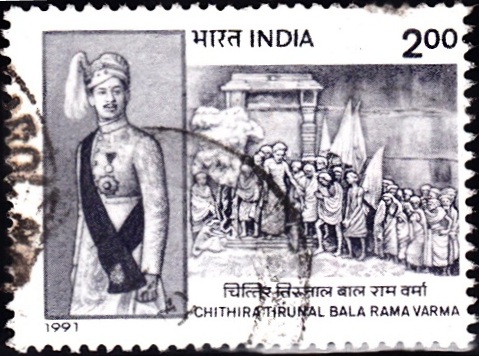
Chithira Tirunal Bala Rama Varma
A commemorative postage stamp on Chithira Thirunal Balarama Varma, last ruling Maharaja of Travancore (1924-49) :
 Issued by India
Issued by India
Issued on Nov 7, 1991
Description of Designs : The commemorative stamp depicts the portrait of the personality and the sculpture on temple entry done by Devi Prosad Roy Chowdhury. The stamp has been designed by the India Security Press, Nashik on the basis of material provided Shri A. Charles, M.P.
Type : Stamp, Postal Used
Colour : Single Colour
Denomination : 200 Paise
Overall size : 3.91 x 2.90 cms.
Printing size : 3.55 x 2.54 cms.
Perforation : 13 x 13
Paper : Indigenous Un W/M Gravure Coated Stamp Paper
Number Printed : 6,00,000
Number per issue sheet : 35
Printing Process : Photogravure
Printed : India Security Press
Name : Sree Padmanbhadasa Sree Chithira Thirunal Balarama Varma
Born on Nov 7, 1912 at Kingdom of Travancore, an Indian kingdom
Died on Jul 20, 1991 at Thiruvananthapuram, Kerala, India
About :
- Chithira Thirunal Balarama Varma was born on 7th November, 1912 (Deepavali Day) in the royal family of Travancore, the descendants of the ancient Chera dynasty, as the eldest son of Maharani Setu Parvati Bayi and Sri Revi Varma Kochukoil Thampuran. Chithira Tirunal ascended the throne on 6th November, 1931 and ruled the State of Travancore as Maharaja from 1931 to 1949. He was the Rajpramukh of Travancore-Cochin State from 1949 to 1956.
- Chithira Tirunal had his education under eminent teachers, Indian as well as European and had his administrative training at Bangalore under reputed statesman. He also travelled widely in Europe and the Far East.
- During his reign, Chithira Tirunal made many progressive reforms in the fields of legislation, agriculture, education, industry and commerce, public transport, judiciary, public health, hydro-electric power and water supply, etc. In the field of social welfare, he worked for the upliftment of Harijans and backward communities by establishing a Harijan Welfare Department and institutions like Chitra Poor Home, Harijan Hostel etc. Almost all these reforms, like the abolition of the death penalty which was the first of its kind in the whole of Asia, were pioneer and progressive steps. The most important of these was the Temple Entry Proclamation by which Chithira Tirunal removed untouchability and threw open all the temples of the State to Harijans and all the Hindus. For this reform, he was hailed as “Asoka the Second” and Mahatma Gandhi praised it as a “historical wonder”.
- Even after retirement from public life, he founded many charitable trusts that are donating substantial funds for charitable purposes and to numerous poor and needy patients for costly treatments like open heart surgery and kidney transplant etc. throughout the country. He has also established institutions of public utility like the Geriatric Centre, Sri Chitra Tirunal Institute for Medical Sciences & Technology and Maharani Setu Parvati Bayi Surgical Centre, where the most modern and sophisticated treatment is made available to everyone, even the poorest of the poor patients.
- Whenever and wherever there was a disaster or calamity, Chithira Tirunal was the first to respond quickly with spontaneous donations and deep feelings for the suffering of the victims which he always tried to alleviate whether within or outside the state.
- Chithira Tirunal Bala Rama Varma passed away, after a brief illness, on 20th July, 1991 at the age of 78.
- Text : Courtesy Kaudiar Palace, Trivandrum.


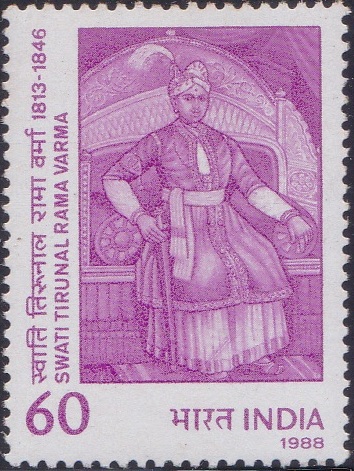
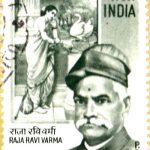
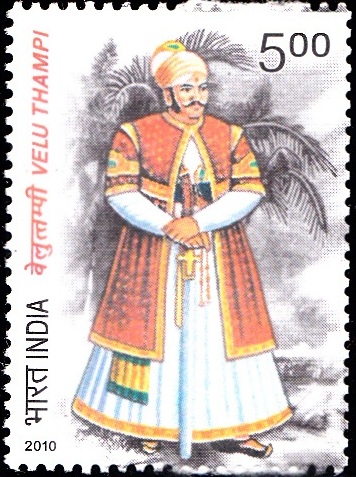

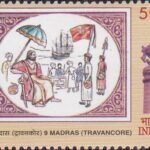
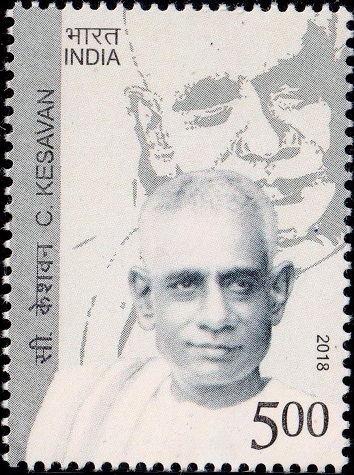
[…] 1801 the ruling king Balarama Varma promoted him as Dalawa, and he is remembered today as the Diwan of Travancore. During […]